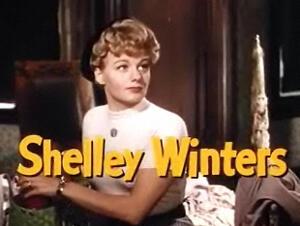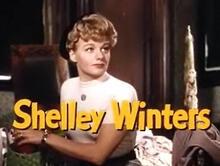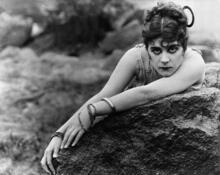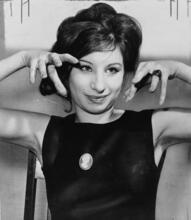Shelley Winters
Shelley Winters (1920-2006) was a movie, television, and stage actor, performing in over 100 movies, 50 stage plays, and many television programs over the course of her career. She also published a two-volume autobiography, written in the feisty outspoken style for which she was known. While most of her roles had no Jewish connection, one of her two Academy Awards was for the role of Mrs. Van Daan in the film version of The Diary of Anne Frank. Winters received a Lifetime Achievement Award at the 1998 Hollywood Film Festival.
Shelley Winters’s acting career ranged from a fairy in a local pageant at age four to the eccentric Grandma Harris on television’s Roseanne. She performed in over 100 movies, 50 stage plays, and countless television programs, and she won two Academy Awards for Best Supporting Actress (for The Diary of Anne Frank in 1959 and A Patch of Blue in 1965) and an Emmy (for Bob Hope Presents the Chrysler Theatre in 1964).
Early Life & Family
Shelley Winters was born Shirley Schrift on August 18, 1920, in St. Louis, Missouri. She was the second of two children, born five years after her sister Blanche. Her mother, Rose Winter, was also born in St. Louis after her parents emigrated from Grymalow, Austria. Winters’ father, Jonas Schrift, also emigrated from Grymalow, marrying his third cousin Rose in America. When Shirley needed a stage name, she took her mother’s maiden name. Later, Universal Studios added the s at the end.
The Schrifts moved to New York in the late 1920s, as Jonas Schrift attempted to work his way up into the middle class. But when Shelley was nine, her father was jailed for arson, a conviction for which he was exonerated after spending a year in prison. In New York, Shelley’s Jewish education consisted of attending the Jamaica Jewish Center, as well as learning pioneer Hebrew songs at her Brooklyn public school. She dropped out of high school to earn money and to act.
Acting Career
When Winters first went to Hollywood in the early 1940s, she was made into a blonde bombshell, although she resisted the nose job the studio executives suggested. With age and experience, she made the transition to character actor. She personally considered her best role in any medium to have been Charlotte in the film Lolita. She practiced the Stanislavsky Method of acting for most of her acting life and taught the method at the Actors Studio in New York.
While the majority of her roles had no Jewish connection, Winters did play a few Jewish roles, such as the hysterical Jewish mother in Next Stop Greenwich Village. In 1950, while on a publicity tour, she visited the two-year-old State of Israel. In the early 1950s, she refused to travel to Germany to film the exterior scenes of the movie I Am a Camera because she could not reconcile the thought of doing so with the image of her Holocaust-survivor uncle Yaekel, who spent the rest of his life searching for his wife and family, even though the Jewish Agency reported that they had starved to death in a boxcar left on a siding. Instead, a double was used for her in the footage filmed in Germany.
In 1959 Winters won an Oscar for her role as Mrs. Van Daan in the film version of The Diary of Anne Frank. As preparation, she and the rest of the cast watched films of the concentration camps taken by American soldiers who liberated the camps. Thereafter, she was unable to read or watch anything Holocaust-related. During the filming, she met Anne’s father, Otto Frank, and promised him that if she won an Oscar for that role, she would donate it to the Anne Frank Museum in Amsterdam. She did win, and her Oscar is mounted on the wall of the museum.
Shelley Winters happily accepted a Lifetime Achievement Award at the 1998 Hollywood Film Festival, saying “this award is bigger than the Oscars! It’s about time Hollywood started to pay less attention to … violence, and more attention to human beings and relationships.”
Writing & Activism
In addition to her acting, Winters also wrote a play, One Night Stands of a Noisy Passenger, which was produced in 1971. She also published two volumes of autobiography: Shelley, Also Known as Shirley, and Shelley II, both written in the feisty and outspoken style for which she was known. Her unconventional behaviour can be seen in an 1983 exercise video created by her good friend Debbie Reynolds, where Winters wears a sweatshirt that reads “I’m Only Doing This for Debbie” and spends her time heckling from the back rather than participating.
It was Winters’s zeideh [grandfather] who taught her the lesson of the talmudic Rabbi Hillel when she was only three: “If I’m not for myself, then who is for me? But if I am only for myself, what am I?” Sparked by her grandfather’s teaching, fourteen-year-old Shelley organized a strike at the local Woolworth’s at which she was working. She later participated in civil rights movement activities and campaigned for presidential candidates Adlai Stevenson and John F. Kennedy. Soon after World War II, she engaged in a three-month tour for the United Jewish Appeal.
Marriage
Winters was married three times. Her first marriage was to a man she always referred to by a pseudonym. Because he was not a public figure, she preferred to safeguard his privacy. Her second husband was the Italian actor Vittorio Gassman. They were married in 1952 but divorced in 1954 because neither was willing to move to the other’s country. They had a daughter, Vittoria. Her third husband, Tony Franciosa, was also an actor. They were married in 1957 and divorced in 1960.
Shelley Winters was hospitalized in October 2005 after a heart attack. On January 14, 2006, she died of heart failure at the Rehabilitation Center of Beverly Hills.
Works by Shelley Winters
Shelley: Also Known as Shirley (1980).
Shelley II: The Middle of My Century (1989).
Ragan, David. Who’s Who in Hollywood 1900–1976 (1977).
Syme, Rachel. “Watching Shelley Winters Go Rogue in Debbie Reynolds’s 1983 Exercise Video, ‘Do It Debbie’s Way’.” New Yorker, April 9, 2019.






